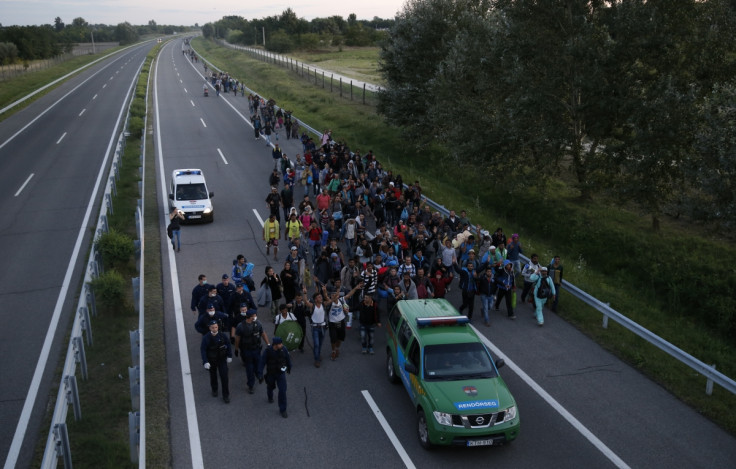Migrant crisis: Hungary hastens border fence works as EU debates quota system

Hungary vowed to hasten the building of a border fence to keep migrants out, after clashes broke out between police and refugees trying to reach northern Europe.
Prime Minister Viktor Orban told the local Magyar Idok newspaper the government is to boost the workforce to speed up construction of the controversial 174-kilometre barrier, initially due to be completed at the end of August. Work delays are reported to have played a major role in the resignation of defence minister Csaba Hende.
Hours before the interview was published hundreds of migrants broke through police lines at the first refugee centre after the Serbian border near the village of Roszke, to set off for Germany and other European countries on foot.
Pepper spray fired by security forces did not stop the crowd who chanted their desired destination: "Germany! Germany!" They entered a highway, partially blocking it, and headed north for Budapest.
Hungarian police said 2,706 people had entered the country illegally on Monday and hundreds more had been arriving today (8 September). At Budapest's main Keleti railway station, about 200 were queuing to board trains for Austria and other EU countries.
Meanwhile European leaders were discussing how to cope with the unprecedented influx of migrants that has seen a record number of more than 340,000 crossing into EU borders.
The European Commission is to lay out plans to relocate some 120,000 asylum-seekers from the main ports of entry (Italy, Greece and Hungary) to other EU states based on a quota system unattractive to some members.
The plan is backed by Germany, already expecting 800,000 asylum applicants and refugees this year, and France, with President Francois Hollande who pledged to take in 24,000 over the next two years.
It has however met the opposition of a number of governments in the 28-country block, including Spain, Poland and Hungary. Orban has in fact attacked the quotas idea as unviable arguing relocation will not stop migrants travelling to a country of their choice benefiting from the EU Schengen Agreement for open borders at a later stage. The system will reportedly allow countries that do not want to take in more asylum-seekers pay an opt-out penalty fee instead.
The 120,000 refugees to be relocated will add to the 40,000 that EU governments had agreed to redistribute on voluntary basis earlier this summer. They will be assigned to the various countries on the basis of a formula that takes into account national income, population size and unemployment rate among other factors, Reuters reported.
According to the news agency, the scheme will have France receiving 30,783 refugees, Germany 40,206, Poland 11,946, Spain 19,219, Sweden 5,838 including countries like Malta that will take in 808 people.
The Vatican is also lending a hand after Pope Francis urged all Catholic parishes to house migrant families. Holy See officials said they had started a process to identify the first two families who will be housed and cared for at the Vatican's two parishes of St. Peter's and St. Ann's.
Britain, which has separately pledged to welcome 20,000 Syrians directly from camps in Turkey and Jordan over the next five years, is not part of the scheme.
© Copyright IBTimes 2025. All rights reserved.






















